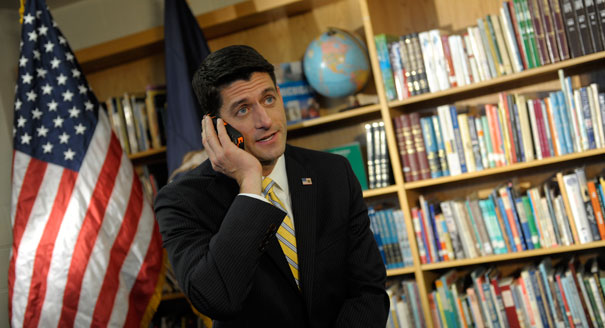Why wouldn’t the new budget proposed by Paul Ryan, who seems to forget that he lost the election, not drive Americans out into the streets screaming? It calls for austerity for people who can least afford it, in this time of ever-increasing income disparity, when only few have felt the effects of the recovery. Maybe it’s partly because our pockets hold those shiny smartphones, amulets equally for the rich and poor, which make it seem like anything is possible, that things will change. But what if that change is not for the better? From “Upgrade or Die,” George Packer’s commentary on the New Yorker site:
“My unprovable hypothesis is that obsessive upgrading and chronic stagnation are intimately related, in the same way that erotic fantasies are related to sexual repression. The fetish that surrounds Google Glass or the Dow average grows ever more hysterical as the economic status of the majority of Americans remains flat. When things don’t work in the realm of stuff, people turn to the realm of bits. If the physical world becomes intransigent, you can take refuge in the virtual world, where you can solve problems–how do I make a video of my skydiving adventure while keeping my hands free?—that most of your countrymen didn’t know existed. [Evgeny] Morozov puts it this way: ‘Last year the futurist Ayesha Khanna even described smart contact lenses that could make homeless people disappear from view, ‘enhancing our basic sense’ and, undoubtedly, making our lives so much more enjoyable. In a way, this does solve the problem of homelessness—unless, of course, you happen to be a homeless person.’
The strange thing is that technological romanticism doesn’t divide Americans. In an age when class and wealth determine everything from your food and beverage to your TV shows, news sources, mode of air travel, education, spouse, children’s prospects, longevity, and cause of death, it’s the one thing that still unites us. I know a man in Tampa who was out of work for nine months after losing his job at Walmart, and more than once almost ended up on the street with his wife and two children. Last week, he was finally hired by a food conglomerate to drive from one convenience store to another, checking the condition of snack bags on the shelves. Like the unemployed Italian man in The Bicycle Thief who gets hired to put up movie posters and has to pawn his wedding sheets to buy the bike required for the job, the Tampa family had to sell some of their DVDs so the father could buy decent clothes and shoes and pay for gas.
But he didn’t need to purchase a smart phone. He already had one. And in the future, when the price drops below its current fifteen hundred dollars, the unemployed might wear Google Glass, too. Perhaps it will allow them to disappear from their own field of vision.”
Tags: Ayesha Khanna, Evgeny Morozov, George Packer

